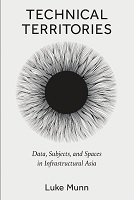Technical Territories
External Review of Whole Manuscript
Data, Subjects, and Spaces in Infrastructural Asia
Author(s)
Munn, Luke
Collection
Knowledge Unlatched (KU)Language
EnglishAbstract
Territory is shifting. No longer defined by the dotted line of the border or the national footprint of soil, today’s territories are enacted through data infrastructures. From subsea cables to server halls, these infrastructures underpin new forms of governance, shaping subjects and their everyday lives. Technical Territories moves from masked protestors in Hong Kong to asylum-seekers in Christmas Island and sand miners in Singapore, exploring how these territories are both political and visceral, altering the experience of their inhabitants.
Infrastructures have now become geopolitical, strategic investments that advance national visions, extend influence, and trigger trade wars. Yet at the same time, these technologies also challenge sovereignty as a bounded container, enacting a more distributed and decoupled form of governance. Such “technical territories” construct new zones where subjects are assembled, rights are undermined, labor is coordinated, and capital is extracted. The stable line of the border is replaced by more fluid configurations of power. Luke Munn stages an interdisciplinary intervention over six chapters, drawing upon a wide range of literature from technical documents and activist accounts, and bringing insights from media studies, migration studies, political theory, and cultural and social studies to bear on these new sociotechnical conditions.
Keywords
data infrastructures, undersea cables, data centers, data politics, territory, geopolitics, networked media, internet governance, citizenship, immigration, borders, human rights, media studies, infrastructure studies, powerDOI
10.3998/mpub.12584902ISBN
9780472076031, 9780472056033, 9780472903375Publisher
University of Michigan PressPublisher website
https://www.press.umich.edu/Publication date and place
2023Grantor
Classification
Politics and government
Central / national / federal government policies
Globalization
International relations


 Download
Download